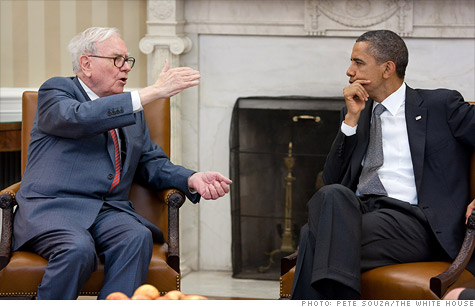Search News

Obama has named the new tax proposal after billionaire Warren Buffett, who supports taxing the rich.
WASHINGTON (CNN) -- The White House will propose a new tax rate for people earning more than $1 million a year to ensure that they pay at least the same percentage of their earnings in taxes as middle-income Americans, administration and White House officials told CNN on Sunday.
Called the Buffett Rule, the proposal will be part of a comprehensive deficit reduction plan President Barack Obama will unveil on Monday, according to a senior administration official and White House sources who spoke on condition of not being identified. The information was first reported by The New York Times.
The plan's name refers to billionaire Warren Buffett, who has complained that wealthy Americans like himself pay less than their fair share in taxes under the current tax code.
Obama will propose several tax changes, one White House official said, adding that the Buffett Rule would replace the current Alternative Minimum Tax that was created to ensure people paid a minimum percentage of their income in taxes.
According to the White House official, the Buffett Rule would impact only 0.3% of taxpayers -- fewer than 450,000 individuals.
The president will not specify a specific rate or details of the Buffett Rule in announcing his proposal, leaving it to Congress to decide how to calculate such a rate as part of the larger debate over rewriting the tax code, the official said.
"I think [Buffett's] basic observation that he pays too little taxes is right," former Congressional Budget Office Director Alice Rivlin told CNN's Candy Crowley on Sunday. "But the way to fix the tax code is to fix the tax code -- not to add another complication."
Obama's deficit reduction plan is expected to also propose changes to the Medicare and Medicaid government health care systems for senior citizens, the disabled and the poor.
It will come out as a special congressional committee created under last month's debt ceiling agreement continues its early efforts to forge a deficit reduction plan that can pass Congress by December 23. If the committee's effort fails, more than $1 trillion in spending cuts will automatically kick in, on top of $900 billion in cuts already mandated under the debt ceiling deal.
The issue of tax increases has been at the heart of a divisive policy dispute between Democrats and Republicans. Obama wants to end Bush-era tax cuts on families earning more than $250,000 a year, but Republicans have blocked his efforts, arguing that it will hinder investment.
House Speaker John Boehner last week reiterated his opposition to any tax increases being part of a deficit reduction package being negotiated by the special congressional panel. ![]()
| Overnight Avg Rate | Latest | Change | Last Week |
|---|---|---|---|
| 30 yr fixed | 3.80% | 3.88% | |
| 15 yr fixed | 3.20% | 3.23% | |
| 5/1 ARM | 3.84% | 3.88% | |
| 30 yr refi | 3.82% | 3.93% | |
| 15 yr refi | 3.20% | 3.23% |
Today's featured rates:
| Latest Report | Next Update |
|---|---|
| Home prices | Aug 28 |
| Consumer confidence | Aug 28 |
| GDP | Aug 29 |
| Manufacturing (ISM) | Sept 4 |
| Jobs | Sept 7 |
| Inflation (CPI) | Sept 14 |
| Retail sales | Sept 14 |